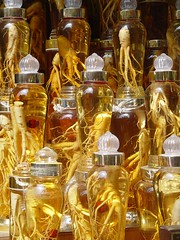 Image by Peter Garnhum via Flickr
Image by Peter Garnhum via Flickr
What is ginseng you ask?
Only the most widely used herb in Asia. Following Traditional Chinese Medicine (TCM) one is the Yang and one is the Yin. This small perennial plant belongs to the Araliaceae botanical family and loves hardwood forests being found in the American Northwest as well as Northeastern China and Korea. The genus name of the ginseng herb (both the Asian and American versions) is panax, which comes from the Greek word meaning “universal remedy or cure all”. Panax ginseng, the scientific name for the Asian variety, is given the Yang or hot designation in TCM. While American ginseng or panax quinquefolium L. is on the other end of the “Qi” spectrum by nourshing Yin, cooling. TCM looks at the body as a set of interconnected systems and so the hot/cold label refers to how the herb impacts a particular body system. The ginseng root resembles a parsnip and is the primary portion consumed.
What does ginseng do?
The list of health benefits attributed to consuming ginseng root would fill pages…some benefits have scientific merit and some don’t. Ginseng is taken to improve athletic performance, strength and stamina, and as an immuno-stimulant. Some people also take ginseng to treat diabetes, cancer, and AIDS. The medicinal effects are attributed to saponin glycosides also known as ginsenosides. Ginsenosides impact the central nervouse system with both stimulatory and inhibitory effects, alter cardiovascular tone, improves insulin sensitivity, enhance humoral and cellular-dependent immunity, and may inhibit the growth of cancer in vitro.
How are they different?
There is variation in the specific ginsenosides in Asian and American ginseng. However, when you compare the clinical research they are both incredibly similar. I left out the benefits that do not have scientific backing, which unfortunately is where differences between the two varieties appear. That is not to say that ginseng does not help in additional ways, but that the scientific research is questionable.
Only the most widely used herb in Asia. Following Traditional Chinese Medicine (TCM) one is the Yang and one is the Yin. This small perennial plant belongs to the Araliaceae botanical family and loves hardwood forests being found in the American Northwest as well as Northeastern China and Korea. The genus name of the ginseng herb (both the Asian and American versions) is panax, which comes from the Greek word meaning “universal remedy or cure all”. Panax ginseng, the scientific name for the Asian variety, is given the Yang or hot designation in TCM. While American ginseng or panax quinquefolium L. is on the other end of the “Qi” spectrum by nourshing Yin, cooling. TCM looks at the body as a set of interconnected systems and so the hot/cold label refers to how the herb impacts a particular body system. The ginseng root resembles a parsnip and is the primary portion consumed.
What does ginseng do?
The list of health benefits attributed to consuming ginseng root would fill pages…some benefits have scientific merit and some don’t. Ginseng is taken to improve athletic performance, strength and stamina, and as an immuno-stimulant. Some people also take ginseng to treat diabetes, cancer, and AIDS. The medicinal effects are attributed to saponin glycosides also known as ginsenosides. Ginsenosides impact the central nervouse system with both stimulatory and inhibitory effects, alter cardiovascular tone, improves insulin sensitivity, enhance humoral and cellular-dependent immunity, and may inhibit the growth of cancer in vitro.
How are they different?
There is variation in the specific ginsenosides in Asian and American ginseng. However, when you compare the clinical research they are both incredibly similar. I left out the benefits that do not have scientific backing, which unfortunately is where differences between the two varieties appear. That is not to say that ginseng does not help in additional ways, but that the scientific research is questionable.
Talk with a TCM practitioner to determine which variety will benefit you specifically and equally important talk with your physician before incorporating ginseng into your health routine. Ginseng is a wonderful adaptogen, but can interfere with other medications. Follow your healthcare provider’s advice. There are a number of different methods for taking ginseng from powder to pill to tea. Find one that works for you.
![Reblog this post [with Zemanta]](http://img.zemanta.com/reblog_e.png?x-id=09562b2d-4186-4e7a-b429-d8f4954233a6)


No comments:
Post a Comment